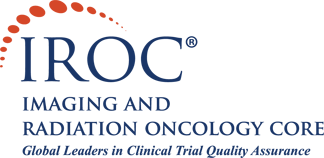Case Review
Case review ensures that the data received meets protocol standards.
IROC specialists collaborate with NCTN group trial teams and protocol PIs to conduct subject case reviews, ensuring that data received meets protocol standards. We conduct RT and imaging reviews using centralized software platforms (e.g., MIM, Mint, TeraRecon) tailored toward the imaging, RT, QA, or analysis needs of the trial.
Subject case reviews are conducted in real-time or retrospectively, with IROC’s assessments communicated to investigators and treating institutions in a timely and efficient manner.Case Review Services
Our Offerings
Digital Imaging Case Review
IROC imaging QA centers provide various levels of central imaging review, from rapid real-time reviews required to guide protocol-specified therapy (e.g., selection of treatment arm, RT planning) to retrospective and batch reviews. The NCTN groups benefit from an infrastructure that provides the following services:
- Virtual environments and specialty software to conduct real-time and retrospective centralized imaging reviews.
- Training on the use of appropriate software, protocol details, timelines, and communication procedures.
- Validation of expected skills based on completion of an assessment procedure.
- Customized reader workflows and processes tailored to the needs of the study.
- Arbitration and qualified backup reader capabilities as a fail-safe mechanism for trials with time-sensitive image review results.
- The use of clinically relevant commercial workstations, including those with advanced visualization 3D and RT integration capabilities.
Radiation Therapy Case Review
State-of-the-art software is used to evaluate and analyze RT data and radiation oncologists have secure access to review treatment plans remotely.
The diagnostic imaging used for planning is fused with the RT plan to ensure the highest accuracy in the dosimetric review process. Radiation treatment charts can be reviewed in a range of formats, which provides the team with a comprehensive overview of the radiotherapy process from start to finish.
Knowledgeable, trained dosimetrists review the RT plan for protocol compliance. Protocol-specific dose-volume analysis (DVA) reviews are completed and provided to the reviewing radiation oncologist, who scores the DVA and contour evaluations. Feedback is provided to the site, and protocol compliance is reported to the study PIs and the LPO/sponsor.
IROC can perform real-time pre-treatment or on-treatment reviews, and provide feedback to the treating site within three business days of receiving a complete data set.
For post-treatment case review, IROC can provide feedback as a reference for planning future enrolled cases. This valuable educational tool also aids in significantly lowering the deviation rate.
Digital Data Integrity Quality Assurance
Once the submission is complete, IROC reviews the submission for completeness and, if needed, queries the site staff listed on the Digital Data Submission Information (DDSI) or IROC RT-1/2 forms to correct and resubmit.
Radiopharmaceutical Therapy Dosimetry
In RPT, a radionuclide is systemically or locally delivered with the goal of targeting and delivering radiation to cancer cells while minimizing radiation exposure to untargeted cells. Assessment of radiation doses in individual patients and their correlation with tumor and normal tissue response to radiation is essential for analyzing the outcome of clinical trials combining RPT with new chemotherapeutic agents. Thus, IROC provides dosimetry evaluation as well as quality assurance for the RPT voxel-level dosimetry.
As there can be interlesion and interpatient heterogeneity in radionuclide intake, dosimetry helps to measure the absorbed dose in each voxel throughout the body. Dosimetry will measure biodistribution, especially in critical organs for toxicity. IROC works with experts in RPT voxel dosimetry and provides protocol templates, quality assurance for imaging and processes, and performs voxel-level dosimetry calculations and evaluations.
